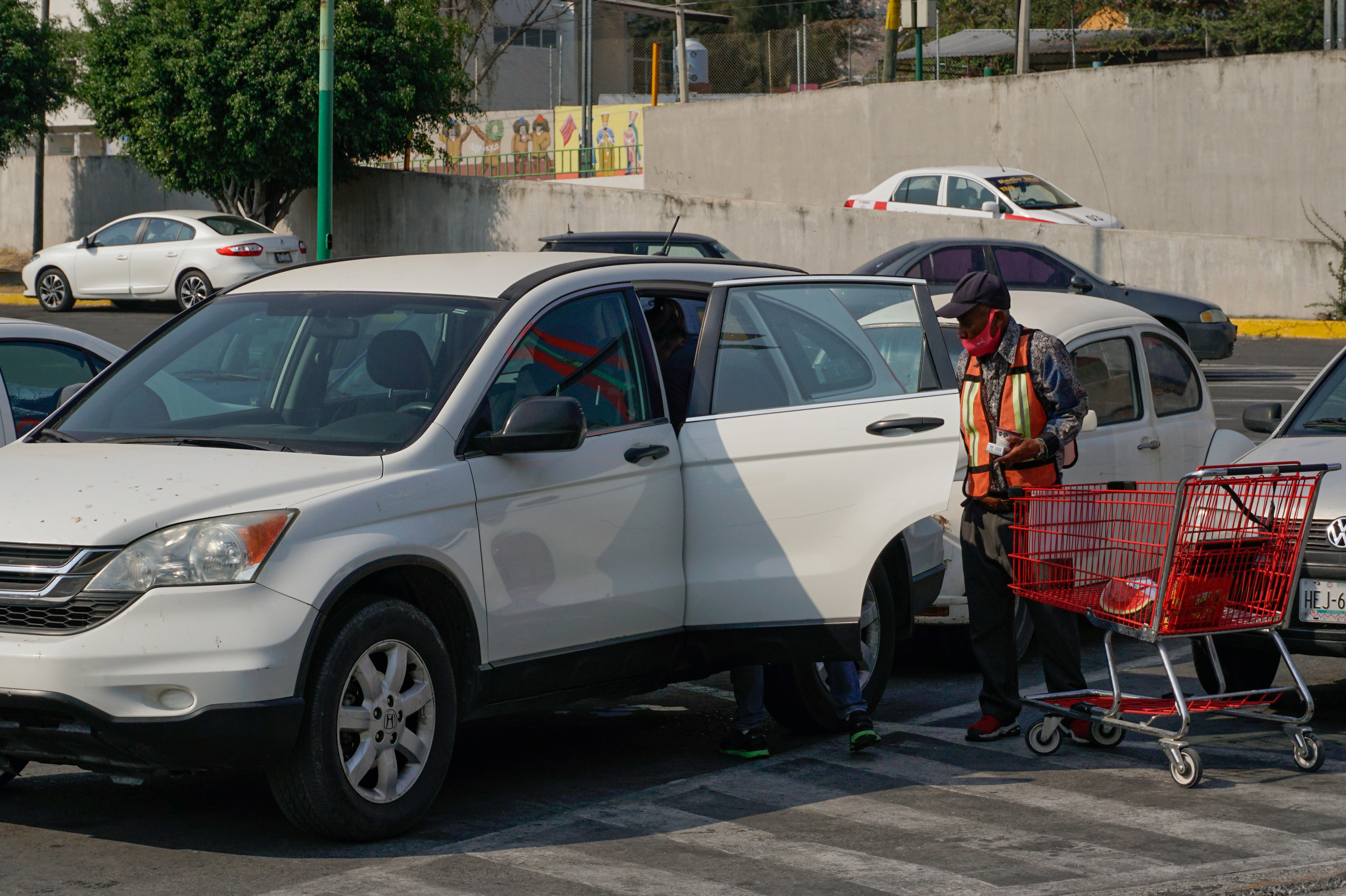
Avigaí Silva, GPJ Mexico
Francisco Alarcón Muñoz clears shopping carts at the store where he works as a parking attendant.
CHILPANCINGO DE LOS BRAVO, MEXICO — Before the pandemic, Juan Felipe Aguilar made money by shining shoes inside the Chilpancingo de los Bravo zócalo, a market square for informal businesses. But in April 2020, the municipal government of Chilpancingo — capital of the state of Guerrero — announced coronavirus restrictions, forcing him to close his shoe-shining stall and leaving the 64-year-old with no income.
Though his age and diabetic condition made him more vulnerable to COVID-19, the disease caused by the coronavirus, Aguilar couldn’t afford to stop working.
But finding work was difficult, he says, as most employers preferred to employ younger people. He started selling firewood. For about six months, Aguilar left his house each morning with a load of firewood balanced on his shoulders. All day, he walked the streets of Petaquillas, the town where he lives, 9 kilometers (5 miles) from Chilpancingo, looking for customers.
“If I don’t go out, who will feed me?” he says.
His struggle exemplifies the economic challenges of many adults 60 years and older in Mexico — an age group that makes up about 12% of the population — who say they receive meager pensions and have few job opportunities and little government infrastructure to support them. Many work in the informal sector, which has been particularly affected by coronavirus prevention measures.
About 41% of adults over the age of 65 live in poverty in Mexico, according to the National Council for the Evaluation of Social Development Policy, a public agency that generates information on social policy and poverty in the country.



Because most worked in the informal sector before retiring, only 28% have a retirement pension, according to a study by Berenice Ramírez, a senior researcher at the Institute of Economic Research of the National Autonomous University of Mexico.
Jesús Miguel Martínez, 64, who works as a parking attendant at a store and earns money through tips, says the pandemic has changed customers’ shopping habits, so he makes less money.
Martínez helps customers find parking and loads their purchases into their cars. But the pandemic has led to fewer shoppers visiting the store, he says. Those who come prefer to keep their distance from parking attendants.
Officials have offered little support to help older adults like them meet their needs, Aguilar says. “The government said that they were going to give us food supplies [during the pandemic], but they did not give us anything.”
Mara Vicencio, at the time of the interview general director of the Guerrerense Institute for Comprehensive Care of the Elderly, a semi-autonomous government institution, says that while the government hasn’t provided special support to cushion older adults from the economic aftershocks of the pandemic, it has continued to provide services.
People over the age of 68 are eligible to apply for the Pensión Universal para Personas Adultas Mayores (Universal Pension for Elderly Adults), a national government welfare program, Vicencio says. Every two months, beneficiaries receive 3,100 Mexican pesos (about $152). Those over the age of 60 also can apply for a card issued by the National Institute for Elderly Adults, which offers discounts on a variety of goods and services.
In an August press release, the institute said it supports older adults by providing legal advice, medical services and job placements, where they can find work in supermarkets as baggers, making money through tips. But the program has had its fair share of challenges since the beginning of the pandemic, including a suspension to curb the spread of the coronavirus, which left many older adults out of work.
Aguilar, like Martínez, who doesn’t qualify for a federal government pension and couldn’t apply for the national institute card because of coronavirus restrictions, feels forgotten.
Francisco Alarcón Muñoz, who receives the federal government pension, agrees. He says the support he receives is barely enough to cover his expenses. At 77, he, like Martínez, must keep working as a parking attendant at a store, the only job he could find at the start of the pandemic.
“I came to work as a [parking attendant] because I no longer had anything to eat,” says the slim, gray-haired man who separated from his family 40 years ago and lives alone. He makes between 100 to 200 pesos a day (about $5 to $10) and worries about not having any savings when he’s no longer able to work. For now, he’s saving the little he can in case he gets sick.
Local and federal government officials didn’t respond to requests for comment about whether they’ve offered additional support to older adults who don’t qualify for the federal government pension, or the allegations that the government promised elderly citizens assistance during the pandemic.
Aguilar reopened his shoe-shining stall after the government lifted restrictions in May, but he says few customers visit, so he makes much less. Before the pandemic, he earned more than 250 pesos a day (about $12). Now he only makes around 150 a day (about $7).
He worries about future restrictions, which he deems likely. He’d have to go back to selling firewood.
Correction: An earlier version of this story misidentified Mara Vicencio’s title. She was general director of the Guerrerense Institute for Comprehensive Care of the Elderly at the time of the interview, but stepped down before the article ran. Global Press Journal regrets the error.
Avigaí Silva is a Global Press Journal reporter based in the Mexican state of Guerrero.
Aline Suárez del Real is a Global Press Journal reporter based in Tecámac, in the state of Mexico.
TRANSLATION NOTE
Sarah DeVries, GPJ, translated this article from Spanish.








